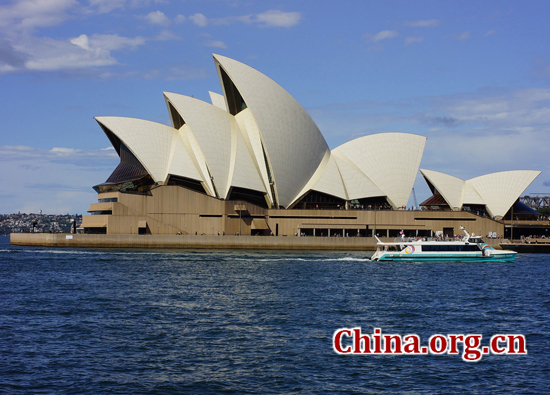Australia, India and the Asian Quad
- By Sumantra Maitra
 0 Comment(s)
0 Comment(s) Print
Print E-mail China.org.cn, August 11, 2018
E-mail China.org.cn, August 11, 2018

Sydney, Australia [Photo by Xu Lin / China.org.cn]
Why is India more reticent over having an aggressive foreign policy while showing no intentions of forming any coalition or being a part of an alignment? This is the question that has been baffling foreign policy analysts in Europe and the U.S.
After all, India was supposed to be a pillar of the democratic Quad in the Indo-Pacific. The Quad itself is supposed to be an alliance of liberal democracies, to promote democracy and free trade but also to balance any rising power in the Asia Pacific. The fundamental goal was, therefore, realpolitik, despite the economic underpinning and humanitarian rhetoric. Incidentally, last time the idea of such a realpolitik alignment was scuttled by Kevin Rudd of Australia, out of fear of antagonizing a rising China.
This time, it is different. While the Quad has met twice recently, Australia, the U.S. and Japan are separately planning to build a trilateral partnership in the region, and invest in Indo-Pacific projects to address infrastructure and development and connectivity. According to a briefing by the Australian government, the partnership has one goal in mind, that is to enhance the peace and prosperity of the region.
Employing the local workforce, this economic blitz is aimed to "attract private capital and build a framework of cooperation....The United States, Japan, and Australia have formed a trilateral partnership to mobilize investment in projects that drive economic growth, create opportunities, and foster a free, open, inclusive and prosperous Indo-Pacific," the Australian government briefing read, with the key words being free, open and inclusive.
Getting on with the program, Mike Pompeo has pledged a new 300-million-dollar security fund for Asia. "As part of our commitment to advancing regional security in the Indo-Pacific, the United States is excited to announce nearly $300m in new funding to reinforce security cooperation throughout the entire region," he was quoted to say.
The new security assistance is intended to tackle "transnational threats" as well as U.S. economic commitment to a region to bolster a "free and open Indo-Pacific." Again, the focus is on Indo-Pacific being a region which is considered "free." The implication is clear; the U.S. is opposed to militarization of Asia and is determined to stop that from happening.
However, three important structural barriers remain. Number one, the scale of investment is heavily tilted towards the Chinese. The comparison between the U.S. investing in Asia and China investing in Asia is incomparable. IR theory dictates, that small countries prefer local powers to invest and safeguard rather than bandwagoning with faraway powers. If that is correct, in the future, we will see more bandwagoning behavior from ASEAN and other Asian countries with China, inviting Chinese investment, and even military cooperation.
Which brings me to India. As I have written before, the Indian strategic circle faces a security dilemma. India is the only country to share an actual border with China. India and China are also both nuclear powers which means India doesn't have to depend on any external great power to provide security, and the power in the maritime domain is equally balanced, with India being more favorable towards its own base, and China being more favorable in the rest of the Indo-Pacific region. It is understandable why India would want to avoid giving the impression that India is determined to side with any coalition or aligning with any power, on either side.
Second, the foreign policy history of India suggests that India prefers to remain non-aligned. It can be stated as its cultural DNA.
Third, and most importantly, the Indian strategic community is independent in the way that it prefers to retain strategic autonomy. Indians don't trust any great power, and that means, it will be loath to join any side. If one can argue that India could be theoretically on the side of democracies, it needs to be stated that Indian democracy is a conservative, majoritarian, nationalist democracy and not a liberal democracy, more similar in character with Israel and Hungary, than Australia or Japan. That makes Indian foreign policy narrow.
Australia is not India, and Australian domestic policy is very different than India's. Australia has to choose between Chinese investment and American security, a choice, India won't have to make, given Indian strategic and military autonomy. It is therefore unlikely that India will join any side, a luxury Australia cannot afford and a reality it will soon have to reckon with.
Sumantra Maitra is a columnist with China.org.cn. For more information please visit:
http://www.china.org.cn/opinion/SumantraMaitra.htm
Opinion articles reflect the views of their authors only, not necessarily those of China.org.cn.






Go to Forum >>0 Comment(s)